Research Skills 2: An Analysis of Bandura's Social Cognitive Theory
VerifiedAdded on 2022/12/09
|12
|1857
|403
Essay
AI Summary
This essay delves into Bandura's Social Cognitive Theory, examining the interplay between cognitive, environmental, and behavioral factors. The report explores the impact of these factors on learning and decision-making, using the context of Dorset CCG and hospital mergers as a practical example. It outlines the conditions for effective modeling, including attention, retention, reproduction, and motivation, highlighting the importance of cognitive factors such as knowledge, expectations, and attitude. The essay further discusses the influence of behavioral factors (skills, practice, and self-efficacy) and environmental factors (social norms), emphasizing their interconnectedness and impact on decision-making within healthcare settings. Advantages and disadvantages of the theory are also discussed, concluding with the significance of adapting to change for organizational development and success. The report emphasizes the need for internal and external analysis to improve learning outcomes and make appropriate decisions.

Research Skills 2
Paraphrase This Document
Need a fresh take? Get an instant paraphrase of this document with our AI Paraphraser
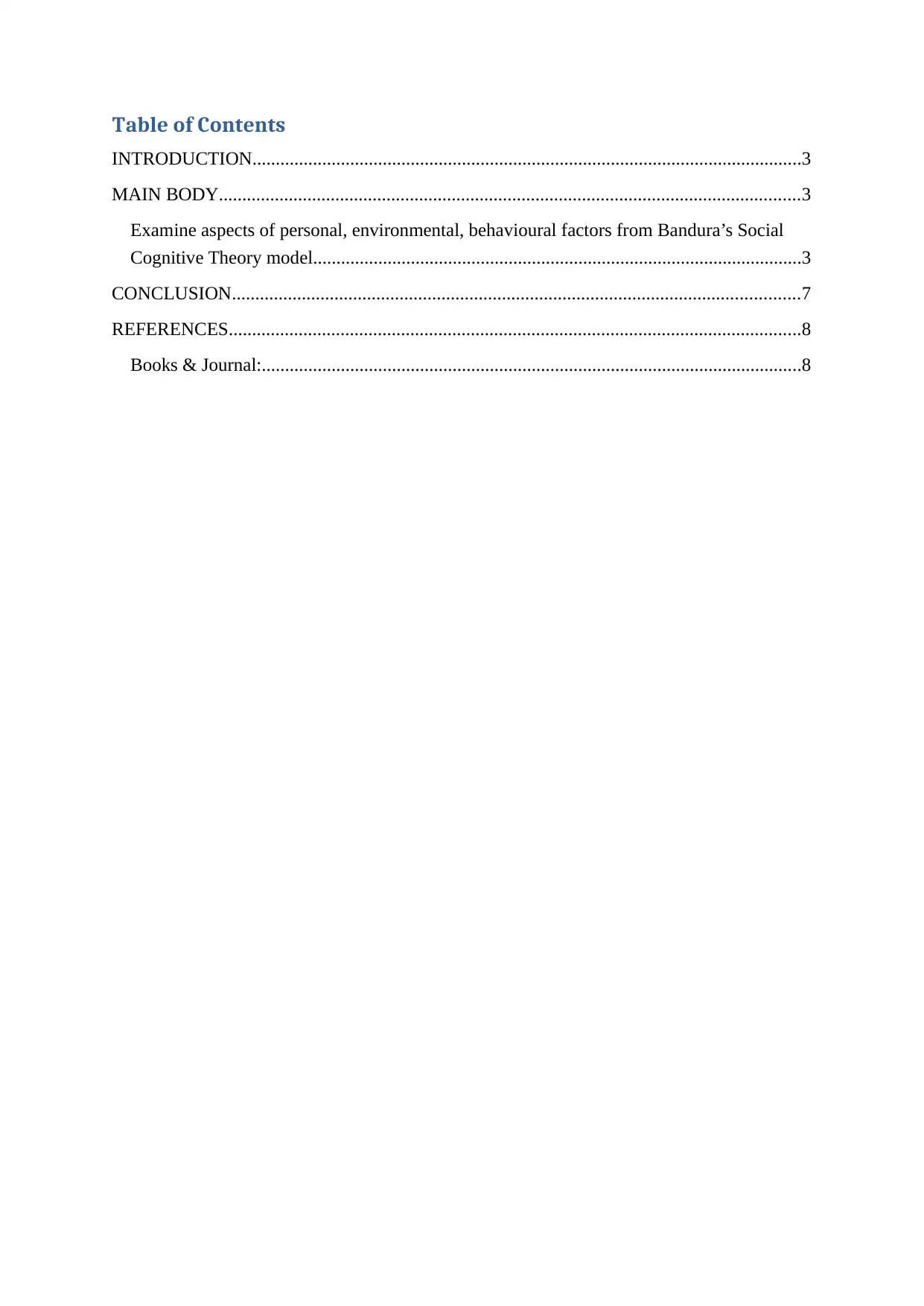
Table of Contents
INTRODUCTION......................................................................................................................3
MAIN BODY.............................................................................................................................3
Examine aspects of personal, environmental, behavioural factors from Bandura’s Social
Cognitive Theory model.........................................................................................................3
CONCLUSION..........................................................................................................................7
REFERENCES...........................................................................................................................8
Books & Journal:....................................................................................................................8
INTRODUCTION......................................................................................................................3
MAIN BODY.............................................................................................................................3
Examine aspects of personal, environmental, behavioural factors from Bandura’s Social
Cognitive Theory model.........................................................................................................3
CONCLUSION..........................................................................................................................7
REFERENCES...........................................................................................................................8
Books & Journal:....................................................................................................................8
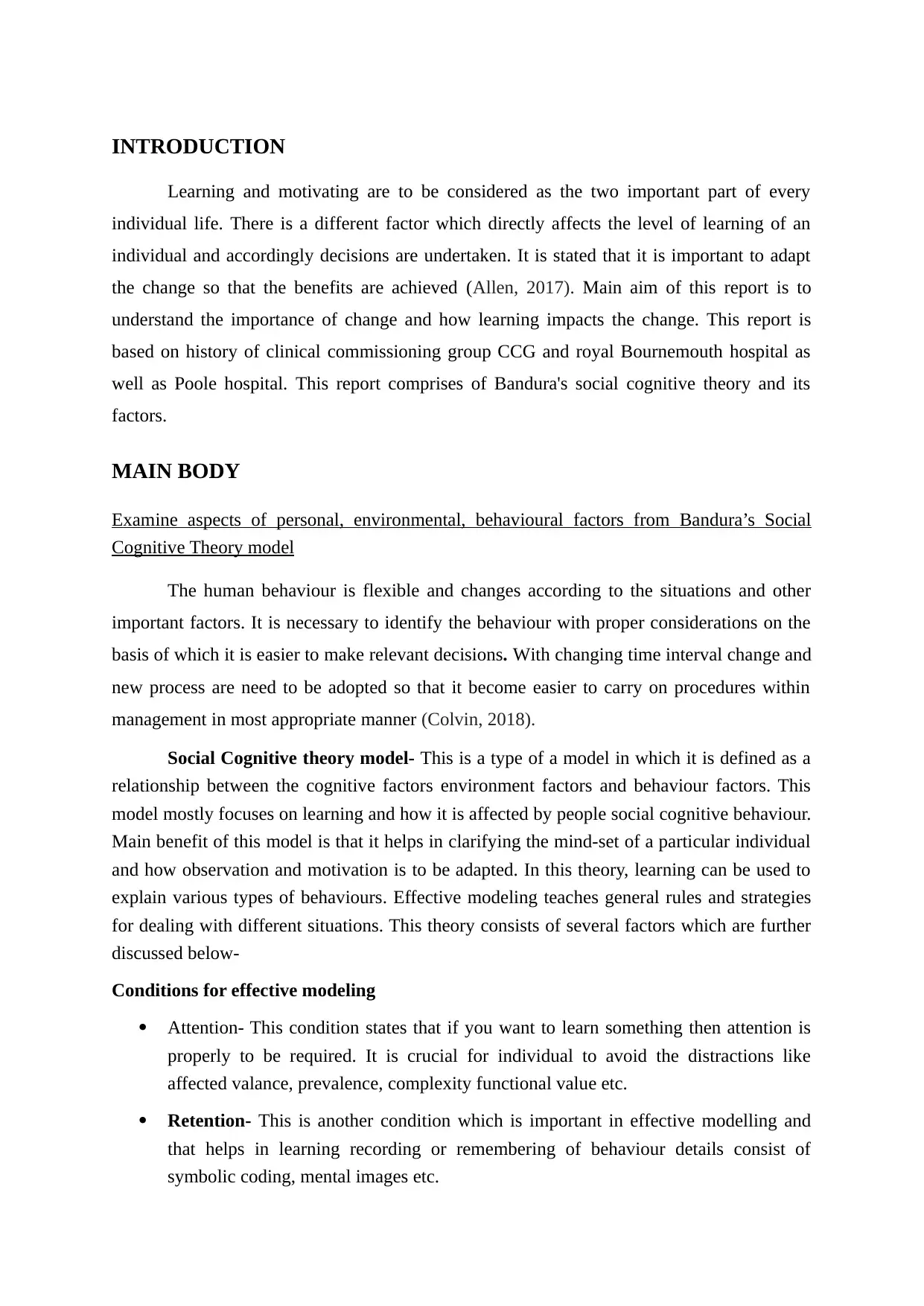
INTRODUCTION
Learning and motivating are to be considered as the two important part of every
individual life. There is a different factor which directly affects the level of learning of an
individual and accordingly decisions are undertaken. It is stated that it is important to adapt
the change so that the benefits are achieved (Allen, 2017). Main aim of this report is to
understand the importance of change and how learning impacts the change. This report is
based on history of clinical commissioning group CCG and royal Bournemouth hospital as
well as Poole hospital. This report comprises of Bandura's social cognitive theory and its
factors.
MAIN BODY
Examine aspects of personal, environmental, behavioural factors from Bandura’s Social
Cognitive Theory model
The human behaviour is flexible and changes according to the situations and other
important factors. It is necessary to identify the behaviour with proper considerations on the
basis of which it is easier to make relevant decisions. With changing time interval change and
new process are need to be adopted so that it become easier to carry on procedures within
management in most appropriate manner (Colvin, 2018).
Social Cognitive theory model- This is a type of a model in which it is defined as a
relationship between the cognitive factors environment factors and behaviour factors. This
model mostly focuses on learning and how it is affected by people social cognitive behaviour.
Main benefit of this model is that it helps in clarifying the mind-set of a particular individual
and how observation and motivation is to be adapted. In this theory, learning can be used to
explain various types of behaviours. Effective modeling teaches general rules and strategies
for dealing with different situations. This theory consists of several factors which are further
discussed below-
Conditions for effective modeling
Attention- This condition states that if you want to learn something then attention is
properly to be required. It is crucial for individual to avoid the distractions like
affected valance, prevalence, complexity functional value etc.
Retention- This is another condition which is important in effective modelling and
that helps in learning recording or remembering of behaviour details consist of
symbolic coding, mental images etc.
Learning and motivating are to be considered as the two important part of every
individual life. There is a different factor which directly affects the level of learning of an
individual and accordingly decisions are undertaken. It is stated that it is important to adapt
the change so that the benefits are achieved (Allen, 2017). Main aim of this report is to
understand the importance of change and how learning impacts the change. This report is
based on history of clinical commissioning group CCG and royal Bournemouth hospital as
well as Poole hospital. This report comprises of Bandura's social cognitive theory and its
factors.
MAIN BODY
Examine aspects of personal, environmental, behavioural factors from Bandura’s Social
Cognitive Theory model
The human behaviour is flexible and changes according to the situations and other
important factors. It is necessary to identify the behaviour with proper considerations on the
basis of which it is easier to make relevant decisions. With changing time interval change and
new process are need to be adopted so that it become easier to carry on procedures within
management in most appropriate manner (Colvin, 2018).
Social Cognitive theory model- This is a type of a model in which it is defined as a
relationship between the cognitive factors environment factors and behaviour factors. This
model mostly focuses on learning and how it is affected by people social cognitive behaviour.
Main benefit of this model is that it helps in clarifying the mind-set of a particular individual
and how observation and motivation is to be adapted. In this theory, learning can be used to
explain various types of behaviours. Effective modeling teaches general rules and strategies
for dealing with different situations. This theory consists of several factors which are further
discussed below-
Conditions for effective modeling
Attention- This condition states that if you want to learn something then attention is
properly to be required. It is crucial for individual to avoid the distractions like
affected valance, prevalence, complexity functional value etc.
Retention- This is another condition which is important in effective modelling and
that helps in learning recording or remembering of behaviour details consist of
symbolic coding, mental images etc.
⊘ This is a preview!⊘
Do you want full access?
Subscribe today to unlock all pages.

Trusted by 1+ million students worldwide
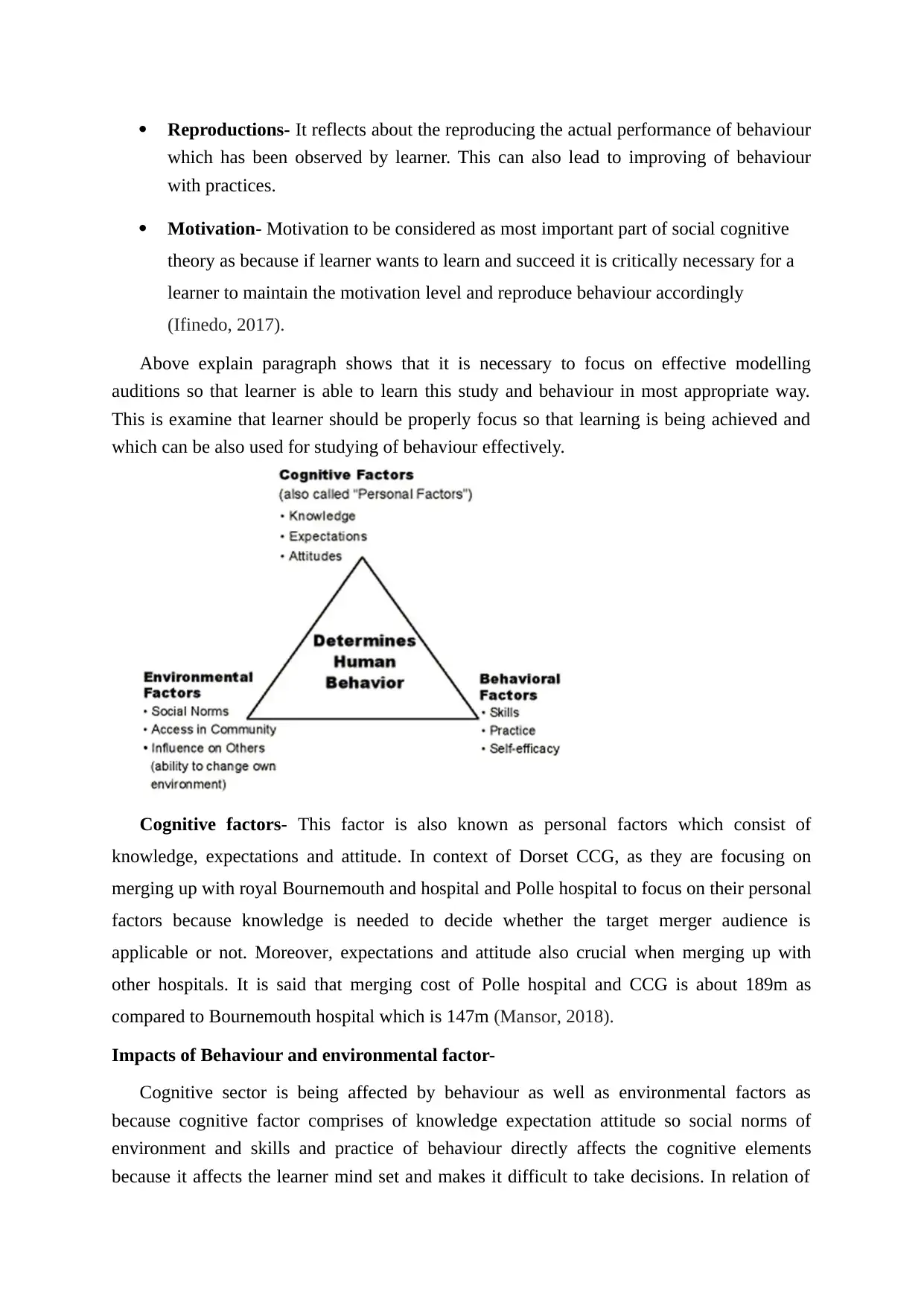
Reproductions- It reflects about the reproducing the actual performance of behaviour
which has been observed by learner. This can also lead to improving of behaviour
with practices.
Motivation- Motivation to be considered as most important part of social cognitive
theory as because if learner wants to learn and succeed it is critically necessary for a
learner to maintain the motivation level and reproduce behaviour accordingly
(Ifinedo, 2017).
Above explain paragraph shows that it is necessary to focus on effective modelling
auditions so that learner is able to learn this study and behaviour in most appropriate way.
This is examine that learner should be properly focus so that learning is being achieved and
which can be also used for studying of behaviour effectively.
Cognitive factors- This factor is also known as personal factors which consist of
knowledge, expectations and attitude. In context of Dorset CCG, as they are focusing on
merging up with royal Bournemouth and hospital and Polle hospital to focus on their personal
factors because knowledge is needed to decide whether the target merger audience is
applicable or not. Moreover, expectations and attitude also crucial when merging up with
other hospitals. It is said that merging cost of Polle hospital and CCG is about 189m as
compared to Bournemouth hospital which is 147m (Mansor, 2018).
Impacts of Behaviour and environmental factor-
Cognitive sector is being affected by behaviour as well as environmental factors as
because cognitive factor comprises of knowledge expectation attitude so social norms of
environment and skills and practice of behaviour directly affects the cognitive elements
because it affects the learner mind set and makes it difficult to take decisions. In relation of
which has been observed by learner. This can also lead to improving of behaviour
with practices.
Motivation- Motivation to be considered as most important part of social cognitive
theory as because if learner wants to learn and succeed it is critically necessary for a
learner to maintain the motivation level and reproduce behaviour accordingly
(Ifinedo, 2017).
Above explain paragraph shows that it is necessary to focus on effective modelling
auditions so that learner is able to learn this study and behaviour in most appropriate way.
This is examine that learner should be properly focus so that learning is being achieved and
which can be also used for studying of behaviour effectively.
Cognitive factors- This factor is also known as personal factors which consist of
knowledge, expectations and attitude. In context of Dorset CCG, as they are focusing on
merging up with royal Bournemouth and hospital and Polle hospital to focus on their personal
factors because knowledge is needed to decide whether the target merger audience is
applicable or not. Moreover, expectations and attitude also crucial when merging up with
other hospitals. It is said that merging cost of Polle hospital and CCG is about 189m as
compared to Bournemouth hospital which is 147m (Mansor, 2018).
Impacts of Behaviour and environmental factor-
Cognitive sector is being affected by behaviour as well as environmental factors as
because cognitive factor comprises of knowledge expectation attitude so social norms of
environment and skills and practice of behaviour directly affects the cognitive elements
because it affects the learner mind set and makes it difficult to take decisions. In relation of
Paraphrase This Document
Need a fresh take? Get an instant paraphrase of this document with our AI Paraphraser
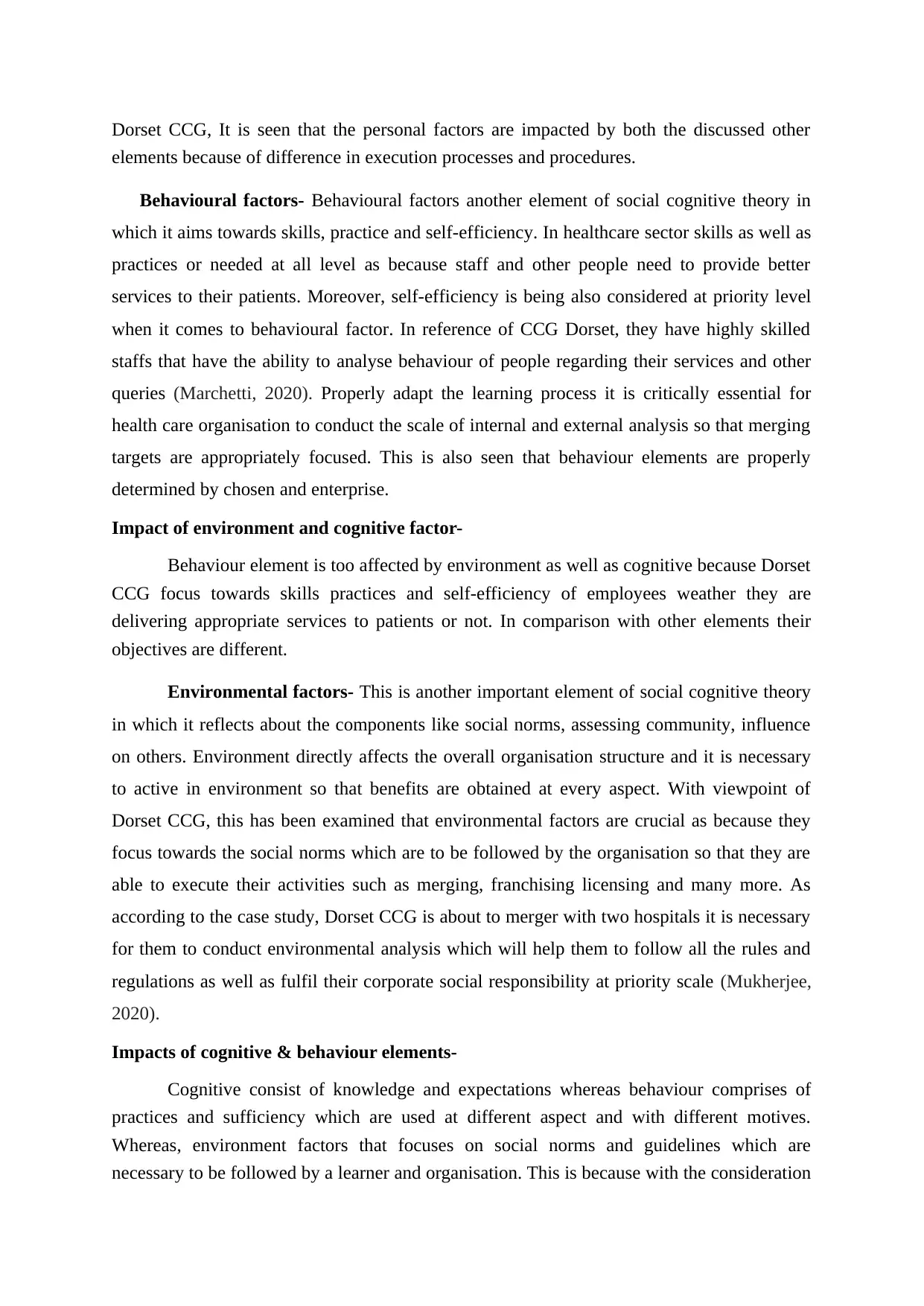
Dorset CCG, It is seen that the personal factors are impacted by both the discussed other
elements because of difference in execution processes and procedures.
Behavioural factors- Behavioural factors another element of social cognitive theory in
which it aims towards skills, practice and self-efficiency. In healthcare sector skills as well as
practices or needed at all level as because staff and other people need to provide better
services to their patients. Moreover, self-efficiency is being also considered at priority level
when it comes to behavioural factor. In reference of CCG Dorset, they have highly skilled
staffs that have the ability to analyse behaviour of people regarding their services and other
queries (Marchetti, 2020). Properly adapt the learning process it is critically essential for
health care organisation to conduct the scale of internal and external analysis so that merging
targets are appropriately focused. This is also seen that behaviour elements are properly
determined by chosen and enterprise.
Impact of environment and cognitive factor-
Behaviour element is too affected by environment as well as cognitive because Dorset
CCG focus towards skills practices and self-efficiency of employees weather they are
delivering appropriate services to patients or not. In comparison with other elements their
objectives are different.
Environmental factors- This is another important element of social cognitive theory
in which it reflects about the components like social norms, assessing community, influence
on others. Environment directly affects the overall organisation structure and it is necessary
to active in environment so that benefits are obtained at every aspect. With viewpoint of
Dorset CCG, this has been examined that environmental factors are crucial as because they
focus towards the social norms which are to be followed by the organisation so that they are
able to execute their activities such as merging, franchising licensing and many more. As
according to the case study, Dorset CCG is about to merger with two hospitals it is necessary
for them to conduct environmental analysis which will help them to follow all the rules and
regulations as well as fulfil their corporate social responsibility at priority scale (Mukherjee,
2020).
Impacts of cognitive & behaviour elements-
Cognitive consist of knowledge and expectations whereas behaviour comprises of
practices and sufficiency which are used at different aspect and with different motives.
Whereas, environment factors that focuses on social norms and guidelines which are
necessary to be followed by a learner and organisation. This is because with the consideration
elements because of difference in execution processes and procedures.
Behavioural factors- Behavioural factors another element of social cognitive theory in
which it aims towards skills, practice and self-efficiency. In healthcare sector skills as well as
practices or needed at all level as because staff and other people need to provide better
services to their patients. Moreover, self-efficiency is being also considered at priority level
when it comes to behavioural factor. In reference of CCG Dorset, they have highly skilled
staffs that have the ability to analyse behaviour of people regarding their services and other
queries (Marchetti, 2020). Properly adapt the learning process it is critically essential for
health care organisation to conduct the scale of internal and external analysis so that merging
targets are appropriately focused. This is also seen that behaviour elements are properly
determined by chosen and enterprise.
Impact of environment and cognitive factor-
Behaviour element is too affected by environment as well as cognitive because Dorset
CCG focus towards skills practices and self-efficiency of employees weather they are
delivering appropriate services to patients or not. In comparison with other elements their
objectives are different.
Environmental factors- This is another important element of social cognitive theory
in which it reflects about the components like social norms, assessing community, influence
on others. Environment directly affects the overall organisation structure and it is necessary
to active in environment so that benefits are obtained at every aspect. With viewpoint of
Dorset CCG, this has been examined that environmental factors are crucial as because they
focus towards the social norms which are to be followed by the organisation so that they are
able to execute their activities such as merging, franchising licensing and many more. As
according to the case study, Dorset CCG is about to merger with two hospitals it is necessary
for them to conduct environmental analysis which will help them to follow all the rules and
regulations as well as fulfil their corporate social responsibility at priority scale (Mukherjee,
2020).
Impacts of cognitive & behaviour elements-
Cognitive consist of knowledge and expectations whereas behaviour comprises of
practices and sufficiency which are used at different aspect and with different motives.
Whereas, environment factors that focuses on social norms and guidelines which are
necessary to be followed by a learner and organisation. This is because with the consideration
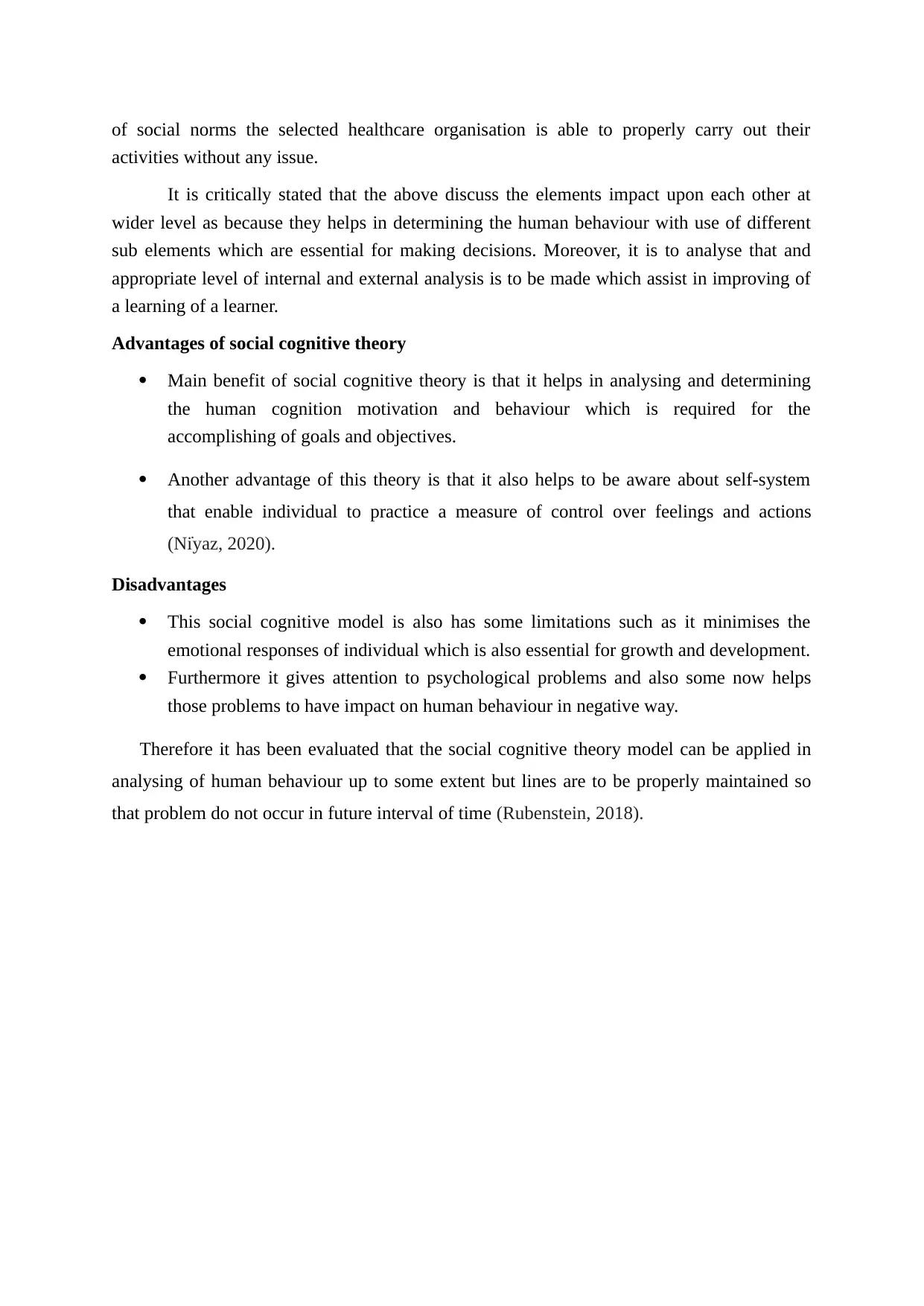
of social norms the selected healthcare organisation is able to properly carry out their
activities without any issue.
It is critically stated that the above discuss the elements impact upon each other at
wider level as because they helps in determining the human behaviour with use of different
sub elements which are essential for making decisions. Moreover, it is to analyse that and
appropriate level of internal and external analysis is to be made which assist in improving of
a learning of a learner.
Advantages of social cognitive theory
Main benefit of social cognitive theory is that it helps in analysing and determining
the human cognition motivation and behaviour which is required for the
accomplishing of goals and objectives.
Another advantage of this theory is that it also helps to be aware about self-system
that enable individual to practice a measure of control over feelings and actions
(Ni̇ yaz, 2020).
Disadvantages
This social cognitive model is also has some limitations such as it minimises the
emotional responses of individual which is also essential for growth and development.
Furthermore it gives attention to psychological problems and also some now helps
those problems to have impact on human behaviour in negative way.
Therefore it has been evaluated that the social cognitive theory model can be applied in
analysing of human behaviour up to some extent but lines are to be properly maintained so
that problem do not occur in future interval of time (Rubenstein, 2018).
activities without any issue.
It is critically stated that the above discuss the elements impact upon each other at
wider level as because they helps in determining the human behaviour with use of different
sub elements which are essential for making decisions. Moreover, it is to analyse that and
appropriate level of internal and external analysis is to be made which assist in improving of
a learning of a learner.
Advantages of social cognitive theory
Main benefit of social cognitive theory is that it helps in analysing and determining
the human cognition motivation and behaviour which is required for the
accomplishing of goals and objectives.
Another advantage of this theory is that it also helps to be aware about self-system
that enable individual to practice a measure of control over feelings and actions
(Ni̇ yaz, 2020).
Disadvantages
This social cognitive model is also has some limitations such as it minimises the
emotional responses of individual which is also essential for growth and development.
Furthermore it gives attention to psychological problems and also some now helps
those problems to have impact on human behaviour in negative way.
Therefore it has been evaluated that the social cognitive theory model can be applied in
analysing of human behaviour up to some extent but lines are to be properly maintained so
that problem do not occur in future interval of time (Rubenstein, 2018).
⊘ This is a preview!⊘
Do you want full access?
Subscribe today to unlock all pages.

Trusted by 1+ million students worldwide
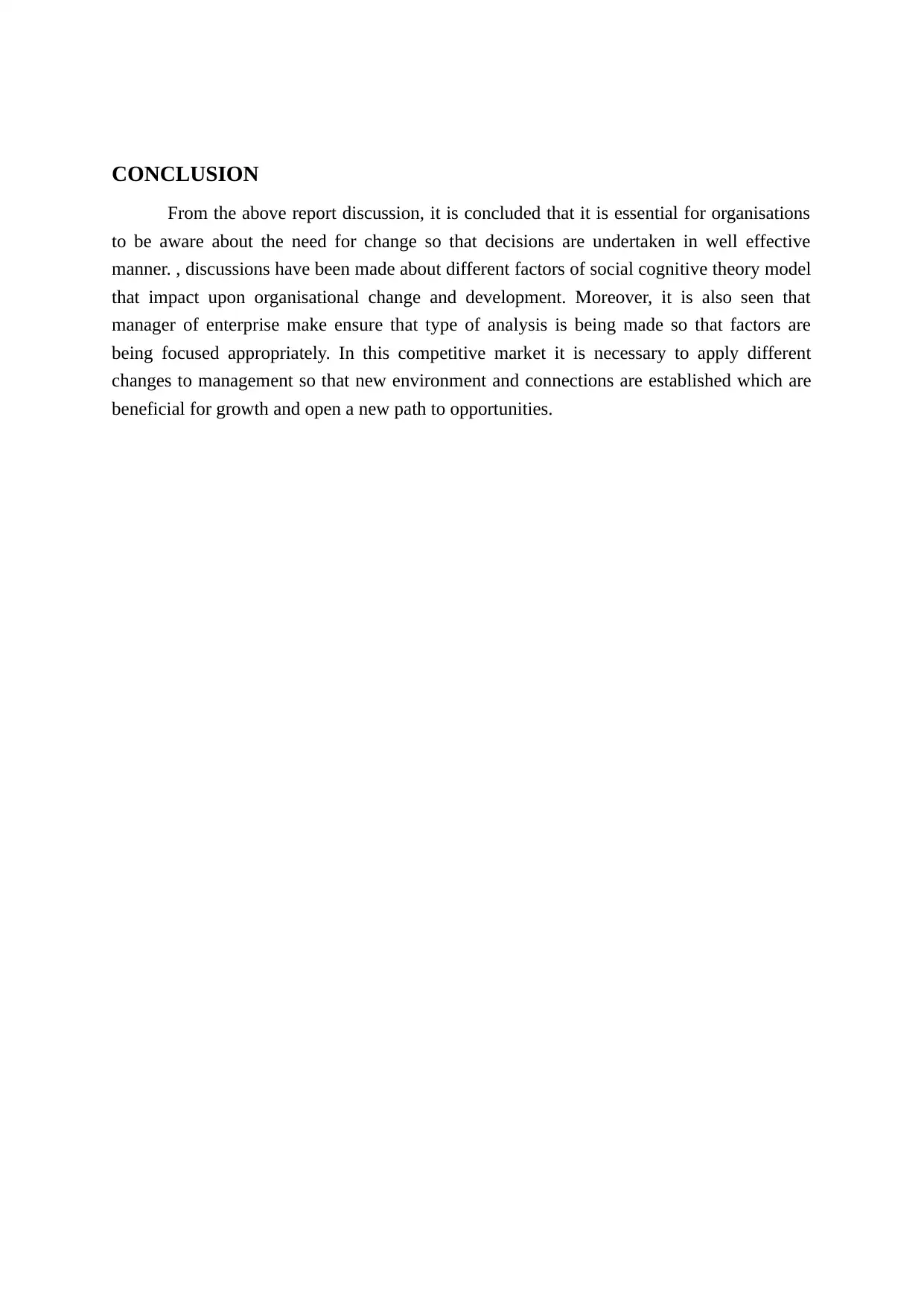
CONCLUSION
From the above report discussion, it is concluded that it is essential for organisations
to be aware about the need for change so that decisions are undertaken in well effective
manner. , discussions have been made about different factors of social cognitive theory model
that impact upon organisational change and development. Moreover, it is also seen that
manager of enterprise make ensure that type of analysis is being made so that factors are
being focused appropriately. In this competitive market it is necessary to apply different
changes to management so that new environment and connections are established which are
beneficial for growth and open a new path to opportunities.
From the above report discussion, it is concluded that it is essential for organisations
to be aware about the need for change so that decisions are undertaken in well effective
manner. , discussions have been made about different factors of social cognitive theory model
that impact upon organisational change and development. Moreover, it is also seen that
manager of enterprise make ensure that type of analysis is being made so that factors are
being focused appropriately. In this competitive market it is necessary to apply different
changes to management so that new environment and connections are established which are
beneficial for growth and open a new path to opportunities.
Paraphrase This Document
Need a fresh take? Get an instant paraphrase of this document with our AI Paraphraser
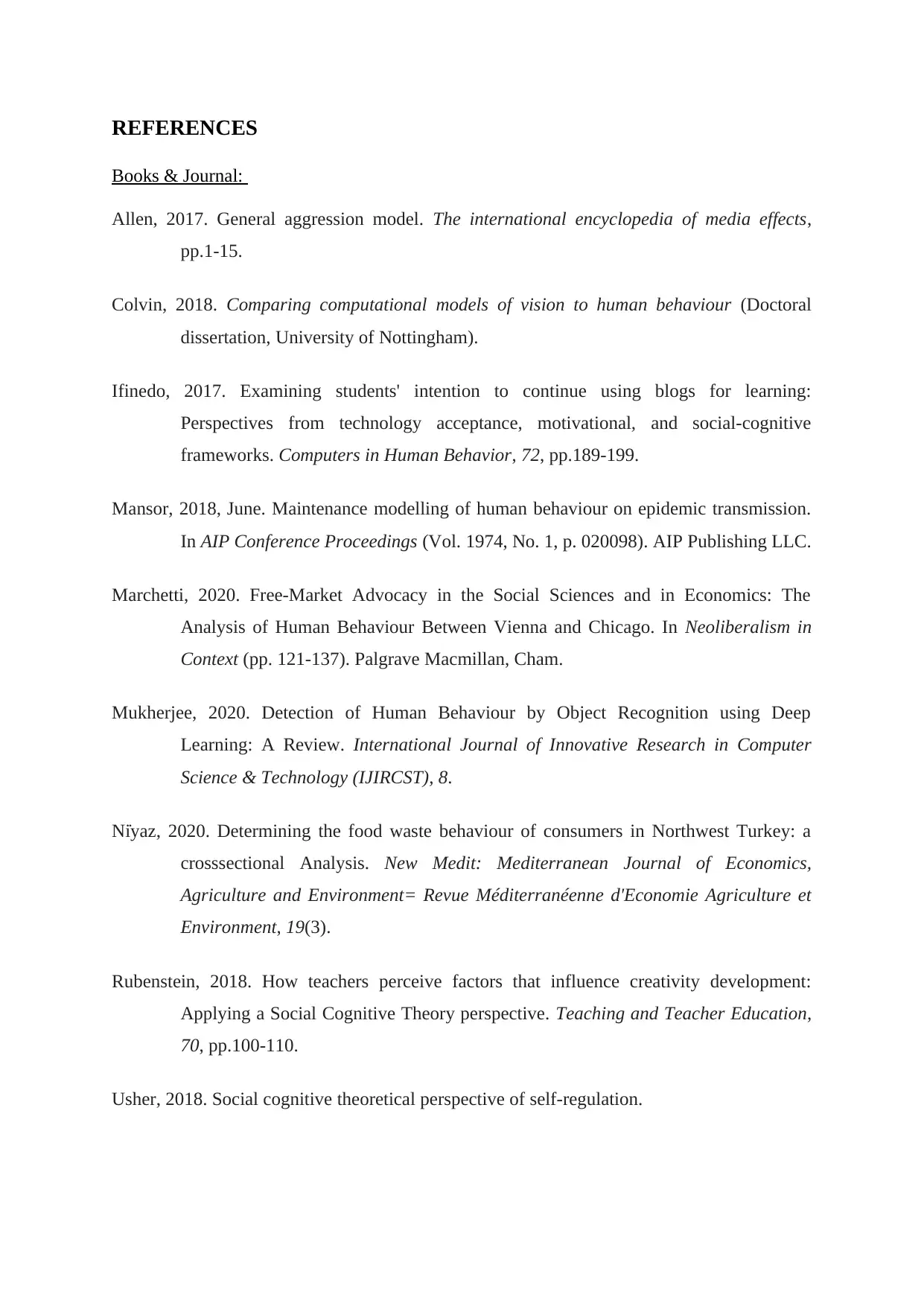
REFERENCES
Books & Journal:
Allen, 2017. General aggression model. The international encyclopedia of media effects,
pp.1-15.
Colvin, 2018. Comparing computational models of vision to human behaviour (Doctoral
dissertation, University of Nottingham).
Ifinedo, 2017. Examining students' intention to continue using blogs for learning:
Perspectives from technology acceptance, motivational, and social-cognitive
frameworks. Computers in Human Behavior, 72, pp.189-199.
Mansor, 2018, June. Maintenance modelling of human behaviour on epidemic transmission.
In AIP Conference Proceedings (Vol. 1974, No. 1, p. 020098). AIP Publishing LLC.
Marchetti, 2020. Free-Market Advocacy in the Social Sciences and in Economics: The
Analysis of Human Behaviour Between Vienna and Chicago. In Neoliberalism in
Context (pp. 121-137). Palgrave Macmillan, Cham.
Mukherjee, 2020. Detection of Human Behaviour by Object Recognition using Deep
Learning: A Review. International Journal of Innovative Research in Computer
Science & Technology (IJIRCST), 8.
Ni̇yaz, 2020. Determining the food waste behaviour of consumers in Northwest Turkey: a
crosssectional Analysis. New Medit: Mediterranean Journal of Economics,
Agriculture and Environment= Revue Méditerranéenne dʹEconomie Agriculture et
Environment, 19(3).
Rubenstein, 2018. How teachers perceive factors that influence creativity development:
Applying a Social Cognitive Theory perspective. Teaching and Teacher Education,
70, pp.100-110.
Usher, 2018. Social cognitive theoretical perspective of self-regulation.
Books & Journal:
Allen, 2017. General aggression model. The international encyclopedia of media effects,
pp.1-15.
Colvin, 2018. Comparing computational models of vision to human behaviour (Doctoral
dissertation, University of Nottingham).
Ifinedo, 2017. Examining students' intention to continue using blogs for learning:
Perspectives from technology acceptance, motivational, and social-cognitive
frameworks. Computers in Human Behavior, 72, pp.189-199.
Mansor, 2018, June. Maintenance modelling of human behaviour on epidemic transmission.
In AIP Conference Proceedings (Vol. 1974, No. 1, p. 020098). AIP Publishing LLC.
Marchetti, 2020. Free-Market Advocacy in the Social Sciences and in Economics: The
Analysis of Human Behaviour Between Vienna and Chicago. In Neoliberalism in
Context (pp. 121-137). Palgrave Macmillan, Cham.
Mukherjee, 2020. Detection of Human Behaviour by Object Recognition using Deep
Learning: A Review. International Journal of Innovative Research in Computer
Science & Technology (IJIRCST), 8.
Ni̇yaz, 2020. Determining the food waste behaviour of consumers in Northwest Turkey: a
crosssectional Analysis. New Medit: Mediterranean Journal of Economics,
Agriculture and Environment= Revue Méditerranéenne dʹEconomie Agriculture et
Environment, 19(3).
Rubenstein, 2018. How teachers perceive factors that influence creativity development:
Applying a Social Cognitive Theory perspective. Teaching and Teacher Education,
70, pp.100-110.
Usher, 2018. Social cognitive theoretical perspective of self-regulation.

Williams, 2017, June. Simulating human detection of phishing websites: an investigation into
the applicability of the ACT-R cognitive behaviour architecture model. In 2017 3rd
IEEE international conference on cybernetics (CYBCONF) (pp. 1-8). IEEE.
the applicability of the ACT-R cognitive behaviour architecture model. In 2017 3rd
IEEE international conference on cybernetics (CYBCONF) (pp. 1-8). IEEE.
⊘ This is a preview!⊘
Do you want full access?
Subscribe today to unlock all pages.

Trusted by 1+ million students worldwide

Paraphrase This Document
Need a fresh take? Get an instant paraphrase of this document with our AI Paraphraser


⊘ This is a preview!⊘
Do you want full access?
Subscribe today to unlock all pages.

Trusted by 1+ million students worldwide
1 out of 12
Related Documents
Your All-in-One AI-Powered Toolkit for Academic Success.
+13062052269
info@desklib.com
Available 24*7 on WhatsApp / Email
![[object Object]](/_next/static/media/star-bottom.7253800d.svg)
Unlock your academic potential
Copyright © 2020–2026 A2Z Services. All Rights Reserved. Developed and managed by ZUCOL.





